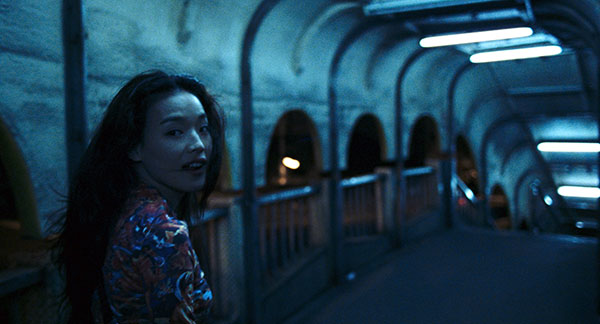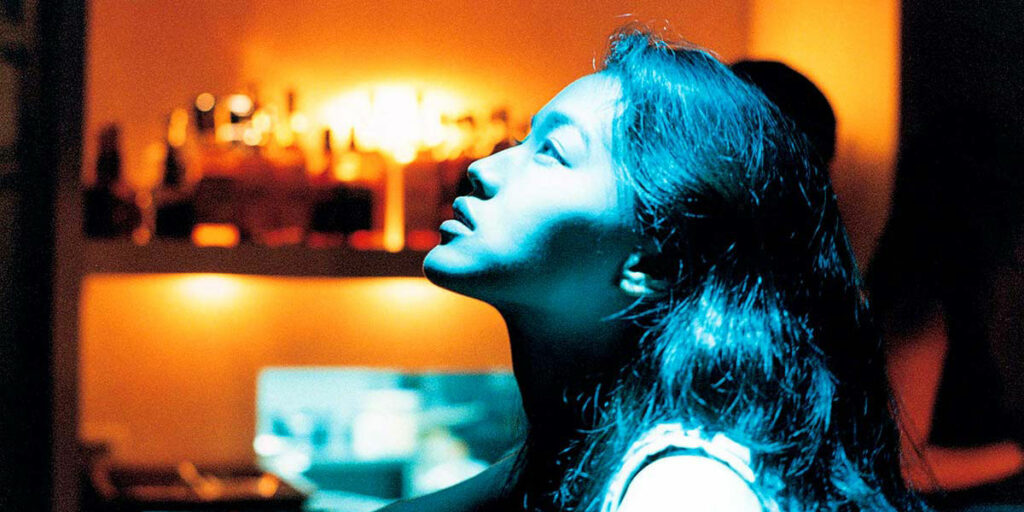Now showing at the Metrograph as a new 4k restoration, Hou Hsiao-Hsien’s Millennium Mambo is a dreamlike look into the past and the decisions we make in our journey to self-discovery.
It is strange and increasingly interesting how time is experienced at different paces when facing diverse situations or emotions. You often hear in songs and records that “time moves slowly”, but, for the most part, especially in your mid-twenties, you don’t undergo this, no matter if you are going through the good times, like the highs of a party, or the bad, like breaking up with your partner after a long period of time. Everything feels like a blur; you perceive the fast-paced motions of a metaphysical clock ticking until it strikes twelve. And, when you start noticing the time, another day has already begun.
The machinations of time are often fascinating, but it hits an existential note when it all goes away in an instant. You start to reflect on the past and those wasted moments where you could have done things differently. However, in the end, it all leads up to where you are now, hopefully for the better. In essence, that’s one of the many aspects covered by Hou Hsiao-Hsien’s critically acclaimed work, Millennium Mambo. The film is now showing at the Metrograph Theater in New York and on Metrograph At Home as a new 4K restoration, with its luscious neon-soaked settings looking marvelous and its emotional impact still remaining intact. The film’s easily flowing runtime is filled with phenomenological delicacies of remembering, and tells a story of the past from a future that can’t be seen.
Millennium Mambo begins with a continuous shot of a woman named Vicky (Shu Qi) walking through a tunnel passage in the dead of night under a row of fluorescent headlights. She looks back as if she’s leaving something behind and moving forward for new things to come. The mellow dance music in the background slowly pulsates until it begins, and coincidentally, Vicky, our narrator through this journey, speaks her first words: “She broke up with Hao-Hao, but he always tracked her down.”
She later lets us know that all of that happened ten years prior, hence setting the film we are seeing in the greeting of the 21st century – as the world celebrates a new millennium. She speaks from 2011, but the version of Vicky we see on-screen was living in 2001. These are memories from a past time that Vicky wants to leave behind so that her life can continue to strive. Most of Millennium Mambo revolves around Vicky’s on-again-off-again relationship with Hao-Hao (Duan Chun-hao). The film shows us the many challenges they face, both as partners and separately, as they detach from each other from time to time.

Vicky knows that the only way for her to escape is to leave him behind, but she cannot move forward, and she’s stuck in an endless cycle of constant fights and nightclub drinking to numb the pain. And it does numb the pain, up to a certain point. This part of Millennium Mambo takes me back to BADBADNOTGOOD’s record with Samuel T. Herring, ‘Time Moves Slow’. The song talks about how it is easy to run away from your problems, but the difficult part comes when you have to feel what it is like to be away from them. It feels similar to what Vicky is going through with her toxic relationship with Hao-Hao, which is attached to her like a curse. When she finds a friend in Jack (Jack Kao), the only person who cares for her more than anybody else, her life receives a new jolt. Yet, after a few sparks, Vicky continues the cycle to fight her inner isolation, and her life remains relatively stagnant.
Without the usual dramatic sensibilities that we see in these types of films, yet with some cinematic trickery that makes it all feel like you’re wandering through the narrator’s mind, Hou Hsiao-Hsien harrowingly and realistically portrays the toxicity and volatility of a broken relationship nearing its untimely end. People often tell themselves “new year, new me” as a corny reminder to change. Still, on the inside, most of them have a pulsating headache because things continue to be the same: affinities remain broken, life remains tangled, and you start to wonder if there is a light at the end of the road that might lead to something better. All these things are showcased throughout the entirety of Millennium Mambo’s dreamlike trance into the neon-bathed Taipei locations and Vicky’s saddened experiences. She recollects her ventures a decade later when everything turned out fine, even though, at the time, it seemed that nothing was going her way.
The film reminds me a little bit of Charlotte Wells’ Aftersun, where an adult version of the main character, Sophie, watches the recordings of a holiday trip she took with her dad when she was a child to piece together one of her happiest memories and try to reconnect with her father. In Aftersun, Sophie’s memories have had a positive impact on her life, as her father was always very supportive and attentive to her needs. Still, by watching the VHS recordings years later, she notices new layers: her father was actually experiencing severe depression and despair at the time. Sophie and Vicky both re-examine their respective pasts as a means to move forward with their lives. Something makes them go back to these memories time and time again, so that one day they can face the truth about someone important in their lives – in this case, Sophie’s father and Vicky’s lover.
The best way to describe these recollections is painful nostalgia. These memories stick in your head for the purpose of healing rather than to cause you harm. Both Aftersun and Millennium Mambo contain their own version of a mind-blurring sequence where the main character realizes something from the past and how it has shaped her future, which comes with a dash of eventual angst because of how much that memory weighs in their head. In one of the best scenes in Aftersun, Sophie watches her young self dance with her father to ‘Under Pressure’, and starts to realize what her father was going through in that moment. This creates a vision of a nightclub in Sophie’s head, where she tries to get a hold of him, not letting him go for one last time.
This specific thing is reflected in Millenium Mambo by the constant intertwining between the effervescence of hanging out and drinking and the sadness within Vicky when she’s all alone. The fragmented structure feels like recollections from the character’s mind onto the screen, leading to endless nights at the Taipei nightclubs and to the shivering coldness of Japan. Either way, Vicky remains on her search for happiness and normalcy. Does she find it, at the end of the day? It may be up to interpretation, but for me, there’s hope in 2011.
Millennium Mambo perfectly captures what it is like to be in your twenties and not know what to do or how to move on into a state of happiness-induced conformity. In some way, shape, or form, most of us have experienced something similar to what Vicky goes through. We’ve been in toxic relationships that have drained our willingness to move on from them, because we feel that “we can’t live with them, and we can’t live without them”.
There’s also our contemplation toward existential irresolution: the sensation of feeling incomplete, or the constant pressure of trying to achieve something and push forward in life. This has been ever-growing since the pandemic struck, and it has devoured many souls into utter despair. Plenty of people found passions that they didn’t know they had during those times of isolation (like me, with film criticism and writing), but, at the same time, there’s this longing to feel whole.
Many other topics are scattered throughout Millenium Mambo’s runtime, all of which have been (or will be) present in different extremes during our daily living. Hou Hsiao-Hsien’s grand piece of work serves as a reminder that all those things are part of life and its injustices, but within those moments of sadness, there’s prosperity. Time curses us all, but in due time everything will find its way; it may be a year from now or perhaps ten, but during our journey for self-discovery.
With this restoration, many will experience this film for the first time, or maybe even their third, and be swayed into the trance of Vicky’s lonely blues while reflecting on one’s own decisions and how those have shaped their current living. Of course, the restoration is astonishing, and the Taipei streets are now clearer (and more beautiful) than ever before, but what’s most exciting about this new re-release is that decades later, you can still be impacted by the story because of what everyone has gone through in these past few years.
A new 4k restoration of Millennium Mambo is now showing at Metrograph Theater and on Metrograph At Home.

